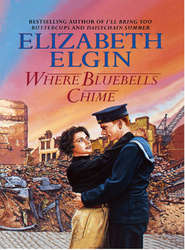По всем вопросам обращайтесь на: info@litportal.ru
(©) 2003-2024.
✖
Windflower Wedding
Автор
Год написания книги
2018
Настройки чтения
Размер шрифта
Высота строк
Поля
35 (#litres_trial_promo)
36 (#litres_trial_promo)
37 (#litres_trial_promo)
38 (#litres_trial_promo)
About the Author (#litres_trial_promo)
By the Same Author (#litres_trial_promo)
Copyright (#litres_trial_promo)
About the Publisher (#litres_trial_promo)
1 (#ulink_bcff8c92-3094-5684-9c74-30a1d722ea41)
1942
Home. Keth Purvis smiled with pure pleasure. Where he was being driven he had no idea, and cared still less, because this morning he had disembarked at Greenock. Not quite home. Holdenby in the North Riding of Yorkshire was home, but Scotland was near enough! Now he was only a telephone call away from Daisy; now, the Atlantic no longer separated them.
‘So do you want the good news first, or the bad?’ his superior in Washington had asked.
‘Whichever, sir.’
They had turned him down, he’d thought; turned down his request to return to England, but the bad news was that that request was approved – with conditions. The good news was that when he returned to England, when a passage could be arranged for him, he would be promoted to the rank of captain.
He wasn’t, he recalled, offered any details. It was a take-it-or-leave-it deal, with no questions asked and no answers given.
He had taken it; had grasped it eagerly, for what condition could be so demanding that Daisy was not worth it?
That had been on his birthday in July. Now it was September and the heather on the hills fading, the bracken turning to gold. Days of waiting became weeks, then months. His elation turned to dejection. They had forgotten him, he was sure of it, until one day he was on his way on a troopship filled with American soldiers and airmen and, though he only once glimpsed them, a score of nurses, carefully chaperoned.
They had not sailed in convoy. The Queen Mary was too fleet to be so confined. She sailed alone, keeping a zigzag course the whole way across the Atlantic to outwit submarine commanders who would give eyeteeth and more to sink her or her sister ship the Queen Elizabeth. The Mary and the Lizzie – and the Mary had borne him safely home. To Daisy.
‘Where are we?’ he asked of the woman driver.
‘Sir – I don’t rightly know …’
‘Somewhere in Scotland, surely?’
‘Yes, sir. Somewhere in Scotland.’ She stared ahead, her cheeks pinking.
‘So if you don’t know where we are,’ he teased, ‘how will you know when we get there?’
She could well be lost, he thought mischievously. It was two years since signposts had been removed – even the one at Holdenby crossroads – so that the enemy, when he parachuted in, should not know where he had landed. Then, Britain daily had expected invasion and though it was almost certain that invasion would never happen now, still the signposts and names of railway stations had not been put back.
‘Sir. I know approximately where I am.’ She glanced at him sideways and saw the smile on his face. ‘And I know exactly where we are going, but you know I can’t tell you!’
‘Of course, Sergeant.’ He didn’t care where they were going. He had always thought – when They had told him his request to return to England had been approved, but with conditions attached – that he would be sent to some out-of-the-way, hush-hush place. Another Bletchley, only in the wilds. Doing exactly the same thing he had done at Bletchley. And where more wild than this, with the road they travelled little wider than a cart track and getting narrower by the mile?
A beautiful wilderness, for all that. To their left, the head of a loch, circled with hills, and to their right, mile upon mile of pine trees and tangled undergrowth and the sun, big and orange, beginning to sink behind those purple hills.
He looked at his watch. Ten o’clock. Daylight lasted longer the further north they travelled. In London – and in Liverpool too – blackout conditions would already be in force, he supposed.
‘What time is blackout?’
‘Depending on where you are – and give or take a minute or two – round about ten o’clock.’
‘Should you have told me that, sergeant?’ he said with mock severity.
‘Oh yes, sir. I got it from the newspaper this morning.’
She was biting on her bottom lip to suppress a smile. She was really rather nice. Married, of course. Her wedding ring was the first thing he noticed about her capable left hand. There were many married women in the armed forces, he supposed, and soon, given luck and seven days’ marriage leave, Daisy would be another of them.
‘I don’t suppose,’ he hazarded, shifting his position the better to see her face, ‘that if we were to pass a phone box you could stop? I’d like to ring my fiancée. We haven’t spoken to each other for –’
‘Sir!’ She cut him short, her face all at once very serious. ‘There are no phone boxes around here. All removed. Security, see. But even if there were and you ordered me to stop – we-e-ll, I’d be bound to report it as soon as we arrived because it would be more than my stripes were worth if I didn’t!’
‘And you’ll report this conversation?’
‘No, sir.’ She was smiling again. ‘Not this time. Only you’ve got to realize the way it is.’
‘Yes. I realize.’ Phones, where they were going, would be listened-in to or scrambled, and every letter he wrote censored. He expected it and he didn’t care, ‘I suppose we are allowed to have phone calls?’
‘With permission, yes, sir. You’ll be able to phone out, sometimes, but there are no calls allowed in. I’ve been there a year now, and I still don’t know the phone number. And when you do phone, you’ll have to get used to the fact that someone will almost certainly be listening.’
‘Hmm.’ He folded his arms and stared ahead. More hush-hush than Bletchley Park, this new destination. At Bletchley he had at least been trusted with the phone.
Then he shifted in his seat, straightened his shoulders and allowed himself a small, secret smile. He was home and soon Daisy would know it in spite of all the petty restrictions.
And that was all that mattered!
Wren Daisy Dwerryhouse, summoned to the phone in the hall at Wrens’ Quarters, Hellas House, said, ‘Dwerryhouse,’ and waited, breath indrawn. It was always like this now, when anyone at all phoned.
Keth? whispered a voice inside her, even though she knew it would be Mam or Drew or Tatty.
‘Hi, Daiz!’ Only Drew called her Daiz. ‘Just thought I’d ring, see how you are and if there are any messages for Rowangarth.’
‘Drew! You’re going home!’
‘Only seventy-two hours. We’re getting de-gaussed again so most of us have got a spot of leave.’
‘Is Kitty going with you?’
‘She is. She managed to wangle it. Well – you know Kitty!’
Daisy knew her, and liked her; liked her a lot in spite of the fact that Kitty’s coming to England had resulted in near heartbreak for Lyndis, with whom Daisy shared a cabin.











